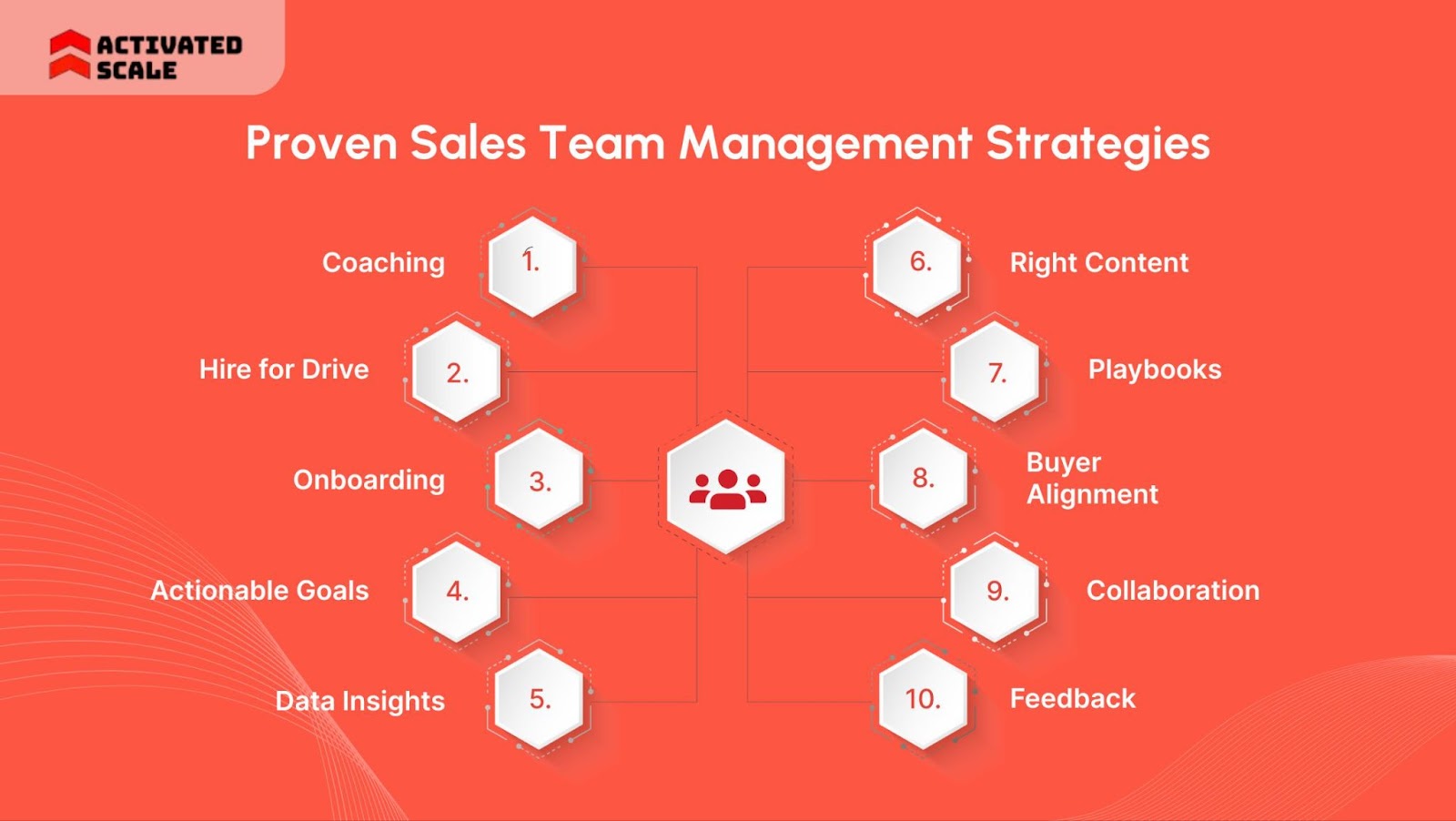High-performing sales teams often hit a wall, not because of weak talent, but due to unclear priorities. Sales reps spend 70% of their time on non-selling tasks. That number reflects a deeper issue.
It says that even skilled reps lose momentum when leadership lacks structure.
Many sales leaders deal with this every quarter. Deals stall, pipeline conversion gets messy, and team motivation fades fast. The pressure grows, but the path forward stays blurry.
To address this, in this blog, you can learn how to manage high-value sales teams with greater control. We’ve studied the core pain points leaders face and curated 10 strategies that actually work in high-stakes sales environments.
In a Nutshell
- Strong sales teams follow documented systems, performance frameworks, and ongoing coaching.
- If conversion rates dip by 5% or more, it’s a signal to audit messaging, ICP fit, or deal stages.
- Cross-functional alignment is a multiplier. Sales teams that collaborate with marketing close faster and churn less.
- High-performing managers review call recordings, give structured feedback, and track rep growth by capability.
- A fractional sales leader can drive execution and process maturity at a fraction of the cost.
Why Strategy Matters in Sales Team Management?
Without a clear system, sales teams rely too much on individual style and instinct. That works for a while, until the targets get missed. With a strategy, you gain tighter control over deal progression across the team.
Strategy also builds trust. Reps perform better when expectations are specific and support is consistent. Instead of relying on urgency at quarter-end, you guide the team through a system that works all month long.
Now, let’s break down 10 proven approaches for managing high-value sales teams. Methods that real companies use to lead with consistency, clarity, and control.
Also Read: Building an Effective SDR Training Program: Powerful Tips & Online Courses
10 Proven Sales Team Management Strategies

The strategies are actionable ways to fix what’s breaking. They focus on team clarity and leadership habits that support real outcomes.
Each one helps you understand how to manage high-value sales teams, not through micromanagement. Here’s the list of 10 proven strategies:
1. Coach One-on-One With Intent
Group sessions don’t address individual problems. Some reps need help with discovery, others with closing or follow-through. A shared meeting can’t fix that.
One-on-one coaching builds trust and reveals blockers. In fact, sales coaching can boost productivity by 8%. Reps speak more honestly when there’s no pressure from peers. That clarity helps you customize your support to what each rep actually needs.
Structured coaching is a key component in managing high-value sales teams. When you coach with focus, reps improve faster and waste less time guessing.
2. Hire Based on Intrinsic Drive
Sales performance often comes down to mindset, not just experience. A strong résumé doesn’t always mean strong execution.
Reps with intrinsic drive push through rejection, follow up without being told, and ask better questions. They don’t just sell, they want to win. That behavior is hard to teach but easy to spot when you know what to look for.
You can start by adjusting your hiring filters. Ask behavioral questions. Use assessments that reveal work ethic, not just product knowledge. A driven rep with a growth mindset will outperform a seasoned one who’s coasting.
Read Also: Hire Sales People for Your Startup
3. Onboard With Structured Training
Early performance depends on what reps learn in the first 30 days. A vague onboarding experience leads to slow ramp-up and uneven results.
If your team receives proper training, you can expect a 50% increase in sales, as they require more than just product knowledge. They need to understand your buyers, your deal cycle, and how success is measured. Without that, even experienced sellers waste time chasing the wrong leads.
Clear onboarding plays a crucial role in managing high-impact sales teams effectively. Build a repeatable plan with milestones, messaging, tool access, role-plays, and shadow sessions.
Need help building an onboarding plan that actually ramps reps? Hire Fractional Sales Leadership from Activated Scale to build strategies that work in the real world.
4. Set Goals that Actually Guide Behavior
Hitting the quota is a lagging indicator. Reps can miss or exceed goals without knowing why. That’s a problem.
Instead, set short-term goals that drive daily focus, meetings booked, follow-ups sent, and accounts researched. These are actions reps can control, and they stack up to bigger wins.
One way to enhance your management is to track key leading indicators. Pair those with weekly check-ins and dashboards that give reps a real view of progress. That shift helps them focus on what moves deals forward.
5. Use Data To Spot Problems Early
Gut instinct doesn't scale. What feels like a “slow month” could be a sign of a bigger breakdown.
Performance data helps you catch problems before they turn into missed quarters. Look at metrics like deal velocity, average touchpoints, and stage conversion rates. These reveal where deals stall or reps fall off.
If you want to understand how to manage high-value sales teams, stop waiting for deals to close. Instead, use data to ask better questions. You can use data as follows:
Typically, at the awareness stage of the sales process, the drop-off rate is 79%. If this rate drops by 5 percentage points, it’s a warning sign that something in your process isn’t working as expected.
6. Enable Reps With the Right Content
Reps waste hours searching for pitch decks, case studies, or follow-up templates. That’s a systems issue.
If you have the right content, your consumers are 131% more likely to be interested in buying. That’s why high-performing teams should give sellers easy access to content that works. That includes talk tracks, objection-handling guides, and deal-stage-specific resources.
Centralize your assets. Train reps to use them. Update resources regularly based on what actually closes deals.
7. Standardize What Works With Sales Playbooks
If every rep runs their own version of the sales process, your pipeline becomes impossible to manage.
Playbooks fix that. They document what works across messaging, qualification, and closing. That gives reps a baseline to follow and managers a system to coach from.
A good playbook creates consistency. That consistency drives predictive accuracy, faster ramp time, and better deal control.
8. Align With the Buyer’s Decision Process
Many deals go dark because reps push the buyer at the wrong time. Suppose when the buyer isn’t ready or fails to act when the buyer is.
Teams win more when they map their sales process to the buyer’s real journey. That includes recognizing when a deal is stuck or when value hasn’t been established yet.
Alignment like this is key to how you manage high-value sales teams. It prevents wasted effort and keeps deals moving based on real momentum.
Your buyers don’t follow a straight line, and your sales process shouldn’t either. Use the Activated Scale’s Fractional Selling service to hire sales reps to sell the way your buyers buy.
9. Encourage Cross-functional Collaboration
High-value sales never happen in silos. Your sales team might carry the number, but they don’t close alone. Marketing, product, and customer success all influence the outcome.
That’s why the best sales leaders build systems for alignment. Weekly syncs with marketing on messaging gaps. A shared Slack channel with support to flag product issues. CS handoff templates for smoother renewals.
Many companies have seen a 50% reduction in employee turnover rate after encouraging collaboration. It means these aren’t just nice-to-haves anymore.
You’re managing the handoffs and dependencies that shape how buyers experience your brand. When everyone supports the deal, everyone wins.
10. Evolve Your Leadership Based on Feedback Culture
What worked when you had three reps won’t work when you have fifteen. Sales leadership is iterative. Your team will show you where to improve if you know how to listen.
Ask where reps get stuck. Take feedback from them. Understand what tools do they ignore? What’s unclear in the process. Then change what needs changing.
Reps leave because leadership feels unresponsive. Prevent this by providing constructive feedback.
Also Read: Creating a Sales Strategy for Small Business Success
Wrapping it Up
A healthy sales team doesn’t only prioritize numbers. It closes better-fit deals. It feeds insights back to the product and gives marketing sharper positioning. Most importantly, it gives leadership clear signals about what’s working and what’s not.
That kind of performance doesn’t come from motivational speeches or rigid playbooks. It comes from strategy, structure, consistency, and discipline. So, use the above proven strategies to bring out the most in your team.
Struggling to turn strategy into execution? Hire a fractional sales leader to build the structure your team needs. Book a Call with Activated Scale to start hiring.
FAQs
- How Do I Know If My Sales Strategy Needs to Change?
Look for signs like inconsistent win rates, slow-moving deals, or reps struggling to hit targets despite activity. - What’s the Difference Between Managing and Leading a Sales Team?
Management is about tracking tasks and enforcing structure. Leadership focuses on coaching, vision, and long-term performance. - How Often Should I Update My Sales Playbook?
Ideally, review it every quarter or after any major shift, such as new ICPs, pricing changes, or product updates. - Can I Implement Sales Improving Strategies Without Adding Headcount?
Yes. Most strategies rely on clarity, focus, and better execution. - What If I Don’t Have a Dedicated Sales Leader Yet?
You can bring in a fractional sales leader to build structure, coach your team, and accelerate growth without the full-time cost.
The Ultimate Guide to Hiring a Salesperson!
Get the step-by-step guide to hiring, onboarding, and ensuring success!
_edi.png)




